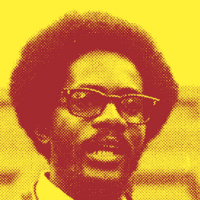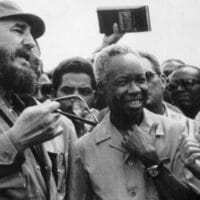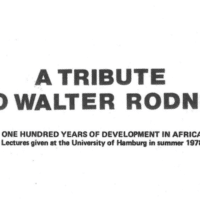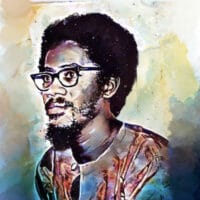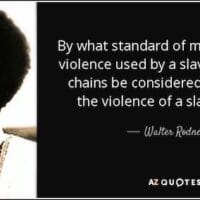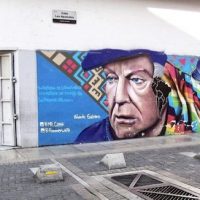-
TRANSCRIPT: The roots and consequences of African underdevelopment, Walter Rodney, 1979
In May 1979, the Center for Afro-American Studies at the University of California, Los Angeles hosted a symposium titled The Political Economy of the Black World. We are publishing, for the first time, Walter Rodney’s thoughtful presentation at this symposium.
-
A difficult return – race, class, and politics in Rodney’s Guyana
In 1974 Walter Rodney and his family returned to Guyana. Rodney immediately faced a country divided between the Indian and African working class, and the brutal and divisive regime of Forbes Burnham. Rodney produced an impressive body of historical work which provided a Marxist explanation for the divide of the country’s working people. Chinedu Chukwudinma continues the story of Rodney’s revolutionary life.
-
The Mecca of African Liberation: Walter Rodney in Tanzania
Karim Hirji, a Tanzanian student, was in a good mood when he went to bed on the 10 July 1969. That evening he had heard the most impressive lecture of his life at the University of Dar es Salaam. The lecture was on the Cuban Revolution and its relevance to Africa. Back in his dorm, he praised the speaker in his diary: “one could almost feel the strong conviction and deep emotions from which he spoke”. The man he admired and later befriended was Dr Walter Rodney.
-
Walter Rodney’s Lost Book: One Hundred Years of Development in Africa
One of the most astonishing books that Walter Rodney–the Guyanese revolutionary and historian–ever wrote was published several years after he was assassinated on 13 June 1980.
-
On Walter Rodney’s Legacy: when anger and organising took over
As a founding member of the group, Braithwaite explains that though Rodney was betrayed, then assassinated, his body destroyed and concerted efforts made to tarnish his record, people around the world continue to develop and build on his immense legacy.
-
Walter Rodney’s death records to be amended and children’s books placed in schools
The martyred revolutionary’s assassination has finally been acknowledged by the Guyana state, and his works will become part of the educational curriculum.
-
Five Centuries of Pillage and Resistance: Latin America and Africa
The tragedy being the suffering Latin America has borne, the optimism being in the recognition that this is not the region’s natural or inevitable destiny, but has been imposed on it through its subjugation to the capitalist system, and is therefore capable of being changed.

